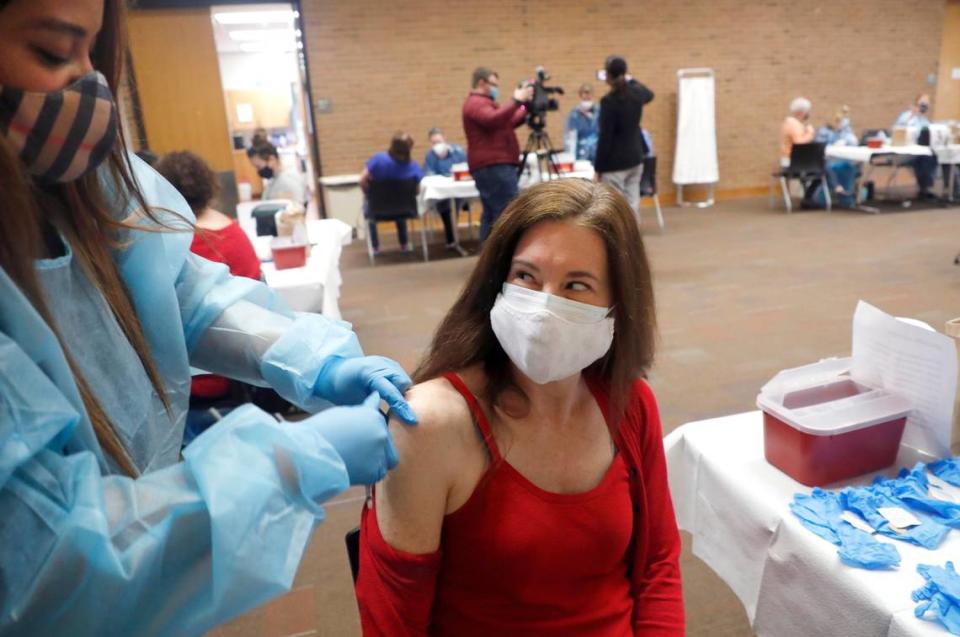The Delta variant in NC is a rising threat. Here’s what we know about the risk.
Now that the Delta variant of the coronavirus is circulating in North Carolina, people need to understand its risks. That is, to the degree the risks are understood. Scientists are still researching the variant. Here is some of what is known.
What is the Delta variant?
Virus variants emerge naturally, due to changes in genetic code. With SARS-CoV-2, this occurs after its infamous spikes attach to the surface of healthy human cells. Once the virus barges inside those cells, it makes copies of itself.
Variants occur when the invader’s genetic code isn’t copied perfectly. Some of these errors, or mutations, make viruses weaker, reducing the chances they will spread more effectively. But some make them more effective at spreading infection.
Fully understanding this variant, detected first in India in December, remains a work in progress. For now, the Delta variant is estimated to be 66% more transmissible than the well-publicized Alpha variant, first reported in the United Kingdom in late 2020, according to state epidemiologist Dr. Zack Moore.
Who named it Delta?
The World Health Organization announced new labels for coronavirus variants of interest in May.
While the public had been referring to viruses by the country where they were first detected, the new label uses the names of Greek alphabet letters instead. WHO made the switch to reduce stigma for countries associated with trouble-making variants early on.
Delta does not replace the scientific name, which is B.1.617.2, but WHO encourages the public to use the simpler term.
Will it spread widely in NC?
The structure of the Delta variant may make it particularly contagious, research suggests. The Delta mutation appears to alter the structure of the spikes that enable the virus to bind to human cells, possibly improving its chances at invading and multiplying.
After being first detected in North Carolina in early April, the variant is spreading, said Moore. The variant is responsible for nearly 30% of detected coronavirus infection in recent weeks, said Moore, who is based at the state Department of Health and Human Services.
It is too soon to tell, but over 90% of coronavirus cases will likely be caused by the Delta variant by the end of this month, Moore predicts.
Will a COVID-19 surge follow?
It is unlikely that we will see the level of surge North Carolina experienced in fall 2020, Moore said. That’s because 53% of adults in this state are fully vaccinated, according to data posted on July 2.
That said, the Delta variant could lead to more infections, illnesses, and death among people who are not vaccinated, Moore said. That has occurred in the United Kingdom, which is a couple of months ahead of the United States in the Delta variant timeline, Moore said.
Individuals who have received only one out of two required vaccine shots are also at risk, Moore said. Experts have observed that a single dose of those vaccines is not as effective against the variant.
Will stricter pandemic restrictions resume?
DHHS has not changed its masking recommendations since announcing that it will follow the May 13 guidance from the Centers for Disease Control and Prevention.
CDC recommends that people who are not vaccinated still wear masks in indoor public spaces. It says vaccinated people should wear masks in health care facilities, transportation hubs like airports, and when traveling by plane, train or bus.
Recommendations could change if COVID-19 vaccines are found to be less effective for protecting against the Delta variant or the number of cases increase, Moore said.

Can people protect themselves?
The best way people can protect themselves from the Delta variant is to get fully vaccinated, said Moore. As far as experts can tell, full doses of vaccines are effective against all circulating variants, he said.
State health officials say that while 53% of state residents 18 and older are fully vaccinated, this protection is not equally distributed among state residents.
While 42% of all white residents had received at least one dose of the vaccine, only 34% of Black residents had as of July 2, according to DHHS data. In addition, 36% of Hispanic residents had received at least one dose, the state estimates.
Will there be more?
Yes. Viruses spawn variants. And variants that are good at infecting people can spread widely, especially when little stands in their way.
“This is going to keep happening. This is not the last variant that we will have with this virus until we get the pandemic under better control, which means getting more people immune,” Moore said.

